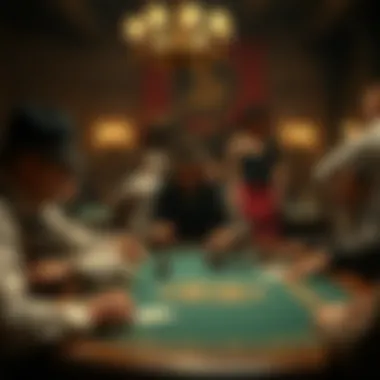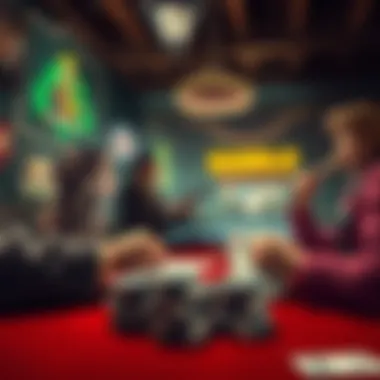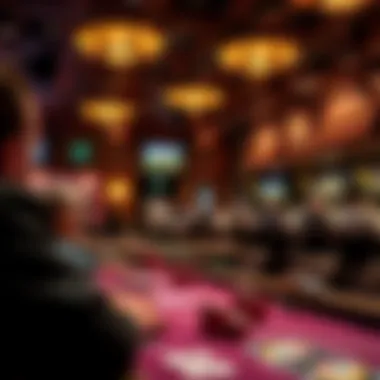The Evolution of Poker in Deadwood: A Historical Perspective


Intro
The history of poker in Deadwood, South Dakota is more than just a chronicle of cards and chips. It is a vivid tapestry woven with the threads of ambition, grit, and a thirst for chance and fortune. Bringing together seasoned gamblers, notorious figures, and the spirit of the Wild West, poker here reflects the changing tides of American culture and law. This introduction sets the stage for exploring how poker evolved within Deadwood, cementing its spot in both local and cultural contexts.
As you stroll down the rustic streets of Deadwood, you can almost hear the echoes of high-stakes games played in dimly lit saloons, where fate often rested on the flip of a card. By examining the roots, development, and societal impact of poker in this historic town, we uncover layers that highlight its significance—tales of legendary players, the legal twists that shaped the poker scene, and the lasting legacy it has left behind.
The next sections will unpack this journey, painting a comprehensive picture of not only the game itself but the environment that fostered it. From the formation of poker's unique rules to the significant cultural implications, Deadwood’s story in the realm of gaming provides insights that transcend beyond mere entertainment. Let's dive deeper into this fascinating world.
Prologue to Poker's Role in Deadwood
Poker isn't just a game; it's a stitched-together narrative filled with the threads of history, culture, and social interaction, particularly in a place as evocative as Deadwood, South Dakota. This settlement, which blossomed during the gold rush, quickly became a hub for all things gambling, with poker sitting at the very heart. In this article, we will explore the significant role poker has played in Deadwood's heritage and how it mirrors the broader themes of American society.
In examining Deadwood’s poker scene, we uncover its evolution from informal games held in the dusty corners of makeshift saloons to organized events that draw attention from enthusiasts and professionals alike. This progression speaks volumes about the human penchant for risk-taking and community building. The significance of poker in Deadwood extends beyond mere recreation; it's a reflection of resilience and the pursuit of fortune amidst adversity.
The Origins of Poker
The roots of poker trace back to several card games, likely borrowing elements from games like poque, primero, and an earlier game known as as nas. Historically, these games were played across various cultures, but it was in the United States – particularly in saloons like those found in Deadwood – that poker truly began to take shape into the version we know today.
Some hold that the game was popularized along the Mississippi River in the early 19th century, but as the U.S. expanded westward, so did the game. It became a staple in the mining boomtowns where fortunes were made—and lost—over the turn of a card. Deadwood, with its wild spirit and colorful characters, naturally became a pivotal location for poker's evolution.
Deadwood's Historical Context
To appreciate poker’s role in Deadwood, one must consider the town's own tumultuous history. Founded in 1876 amidst the Black Hills Gold Rush, Deadwood attracted a diverse group of people, eager for quick wealth and the thrill of chance. This melting pot of miners, gamblers, and outlaws created an environment where poker flourished.
The backdrop of the lawless Wild West added an intriguing dimension to poker games. In the absence of stringent regulations, players often relied on their instincts and social skills. The risk of losing not only a hand but livelihoods and lives brought an intensity to the game that is hard to replicate today. Deadwood’s cultural landscape—informed by grit, ambition, and a pinch of danger—has helped shape poker into a defining aspect of what the town is today. As such, poker in Deadwood is not just about the cards dealt but about the very essence of its historical roots and communal ties.
The Cultural Significance of Poker
The cultural significance of poker goes well beyond the mere act of gambling. In Deadwood, poker has woven itself into the very fabric of its history and social life. Understanding its role helps to appreciate the intricate relationship between the people, the law, and the evolving American identity. In a town once dominated by the gold rush, poker became not just a game, but a lens through which the ethos of a budding society is revealed.
The reasons that poker holds such a prominent place in Deadwood's culture are manifold. For many, it symbolizes the spirit of risk-taking and the quest for fortune that marked the era of the wild West. Gamblers, miners, and townsfolk alike gathered in dimly lit saloons, seeking not only entertainment but a connection to their hopes and dreams. In a society where life trajectories were uncertain, poker offered a semblance of control and a chance to strike it rich, fulfilling a deep-seated American desire for success against the odds.
Moreover, poker's evolution in this region has mirrored significant social changes. Throughout the years, this card game has transformed from being seen as illicit and suspicious in the past to a mainstream entertainment activity today. The journey reflects a broader societal shift, where once frowned-upon behaviors became accepted forms of leisure, showing that poker has effectively adapted to changes in social norms and legal frameworks.
"In Deadwood, poker isn't just a game; it's a storytelling mechanism, a way for characters to come alive and intertwine with the town's storied past."
What lies beneath these social games is a rich tapestry of relationships. Various communities built around poker have flourished, fostering an environment of camaraderie. Gamblers would often share tales of their triumphs and losses, creating bonds that cut across various demographics. Each hand of cards dealt has the potential to unveil personal histories, shaping not only poker strategies but friendships and alliances that persist beyond the walls of the gambling tables.
To sum it up, the cultural significance of poker in Deadwood encapsulates American values, shapes social interactions, and illustrates the town's historical evolution. It embodies not just a pasttime but a narrative woven into the complexities of human experience in a rapidly changing world.
Legal Developments Impacting Poker
The interplay between poker and legal frameworks in Deadwood has carved a distinctive path for the game, greatly influencing how it is played and perceived. Understanding these legal developments provides crucial insight into the evolution of poker, particularly within a historical context. The narrative of poker in this legendary town cannot be disentangled from the broader legal landscape that has shaped gambling across America. This section dives into two pivotal periods: the Outlaw Era, where gambling faced significant restrictions, and the subsequent transition to regulated systems of poker governance.
The Outlaw Era and Casino Regulation
During the 19th century, Deadwood was the kind of place where laws were often more like guidelines—if they existed at all. The gold rush attracted a vibrant mix of prospectors and opportunists, many of whom flocked to poker tables in makeshift saloons that opened as quickly as they shut down. It was a time when honor among thieves took on new meaning, and poker, with its equal parts risk and chance, became a staple activity. However, the lack of regulation led to rampant corruption and chaos, with unsanctioned games sprouting everywhere.
"In a town like Deadwood, where the only guarantee was uncertainty, poker served as both entertainment and an escape, but it was also a breeding ground for conflicts and disputes."
This lawless atmosphere caught the attention of authorities, leading to a push for regulation. Various outlawry laws were enacted, intending to curb the excesses of gaming houses and ensure some order in the tumultuous landscape. Yet, these measures often proved ineffective in quelling the growing popularity of poker. Instead, they pushed the phenomenon underground, giving rise to secretive games that operated in defiance of these laws. From rigged decks to backroom brawls, the Outlaw Era set the stage for a complicated relationship between poker players and the law.
The Transition to Legal Gambling
By the mid-20th century, as societal attitudes shifted towards gambling, Deadwood witnessed a significant transformation in legal governance over poker. The need for regulation became evident to both local authorities and townsfolk tired of the chaotic gambling environment. So, in 1989, South Dakota made a groundbreaking move by legalizing casino gaming. This legislative change opened the floodgates for regulated poker games, signaling a new era.
The establishment of formal casinos brought a level of legitimacy and structure that had been sorely lacking during the Outlaw Era. Gamers were now protected by laws designed to ensure fair play, while operators were held accountable for maintaining integrity. This newfound regulation made poker not just a means of entertainment but also a source of local revenue that helped fund community projects and public services.
As time marched on, Deadwood's poker scene flourished, with casinos like the Deadwood Mountain Grand and Gold Dust Casino offering competitive tournaments and varied formats that appealed to both locals and tourists. The regulated environment also encouraged innovation, ushering in strategic developments that transformed how the game was played.


In essence, the legal developments surrounding poker in Deadwood reflect a continuous balancing act between opportunity and oversight. These laws not only shaped how poker is played today but also added a layer of cultural significance in its relation to regional identity.
Prominent Venues in Deadwood's Poker Scene
Deadwood, a town steeped in lore and rich history, has long been the heart of poker in the American West. This section will illuminate the prominent venues that have shaped the poker scene here, showcasing their unique character and what makes them essential to players and enthusiasts alike. The vibrancy of these establishments contributes not only to the economy of Deadwood but also to its cultural tapestry, where stories of high-stakes games and colorful personalities abound.
Historic Casinos and Poker Rooms
The allure of historic casinos in Deadwood lies in their deep-rooted connections to the town’s gold rush days—a time when fortune seekers flocked to the area hoping to strike it rich. One standout is the Gold Dust Casino, which has been a part of Deadwood since its early days. The Gold Dust not only offers poker games but also encapsulates a genuine slice of Deadwood’s history. Here, players can feel the ghosts of old-time gamblers as they shuffle their cards across weathered tabletops.
Poker rooms like Saloon No. 10, famous for its connection to the legendary Wild Bill Hickok, are also crucial players in the narrative. The walls of this establishment have witnessed countless games, and its bar still serves a wide variety of drinks. Tournament enthusiasts often have a fondness for the Saloon’s ambiance which brings a unique twist to the game.
"In a place where the past and present collide, every hand dealt is a new chance to rewrite history."
Beyond mere gameplay, historic venues serve as hubs for social interaction within Deadwood. They bring people together, illustrating how poker has become part of the community's heartbeat. The charm of old-style gambling halls remains a significant draw for visitors and locals alike.
Modern Establishments and Their Unique Offerings
As Deadwood has evolved, so too have its gaming venues. Modern establishments such as the Tin Lizzie Gaming Resort and the First Gold Hotel and Gaming have incorporated contemporary designs and amenities that cater to today’s players. These venues are equipped with modern poker tables, enticing graphics, and high-tech features that enhance the gaming experience. For instance, the Tin Lizzie features a large poker room that boasts an array of tournaments, welcoming a wider array of players from casual enthusiasts to professionals.
Each of these modern venues offers a blend of gaming and entertainment. The Deadwood Mountain Grand stands out with its concert hall, providing a unique experience where poker nights are paired with live performances. This fusion of gaming and entertainment creates a vibrant atmosphere, allowing for an immersive night out.
Additionally, the innovation seen in today’s offerings often includes themed tournaments and community events, fostering a sense of camaraderie among players. Promotions and special events at these venues also cater to evolving player demographics—particularly appealing to the newer generations keen on mingling and socializing beyond card games.
In summary, the poker venues in Deadwood—both historic and modern—play pivotal roles in nurturing the game’s culture. They not only provide spaces for competition but also serve as vital community hubs that enrich the area's social landscape.
Influential Figures in Poker History
The landscape of poker in Deadwood has been profoundly shaped by a host of remarkable individuals who have left their mark on the game. Their stories are interwoven with the fabric of American culture, reflecting both personal ambition and the broader social dynamics of their time. Understanding the impact of these influential figures is crucial to grasp how poker not only evolved within Deadwood but also how it came to symbolize various values and attitudes in American society.
Key Personalities of the Past
In the gritty saloons and makeshift casino floors of Deadwood during and after the Gold Rush, unique characters emerged—figures whose lives were often as colorful as the poker tables they graced. Among these, Wild Bill Hickok stands out. Known more for his gun-slinging prowess, he was also an accomplished poker player. Legend has it that he was holding a pair of aces and a pair of eights when he was shot in the back. This hand is famously dubbed the “Dead Man’s Hand,” and it serves as a grim reminder of the perils that surrounded gambling in them times.
Another noteworthy personality is Calamity Jane, who, beyond her famed exploits in the West, could also be found at the poker tables. Her presence exemplified the blurred lines between the conventional roles of men and women in a rapidly changing society, offering a glimpse into how poker served as a space for social interaction across gender divides.
Strategic minds like Doc Holliday also made their rounds, bringing the art of bluffing to new heights. His reputation as both a dentist and a gambler combined with his quick temper provided thrilling narratives that cemented his legacy in poker lore. The blend of danger, skill, and social commentary from these figures intricately illustrates the evolution of poker in Deadwood.
Today's Notable Influencers
Transitioning into modern times, poker's evolution continues to be shaped by notable personalities who have redefined the game. Phil Hellmuth, known as the "Poker Brat," has a knack for combining charisma with strategic gameplay. His success at the World Series of Poker has carved a significant niche for him not just in Deadwood, but across the gambling world. His influence extends beyond the felt; he's a vocal advocate for poker's legitimacy as a skill-based game, often discussing the need for televised poker to evolve.
Another significant figure is Daniel Negreanu, whose approach to the game focuses on reading opponents, understanding psychology, and adapting strategies—a necessity in today’s cutthroat poker scene. His efforts to bring an educational aspect to poker, via online platforms and instructional content, resonate with new generations of players eager to hone their skills.
Moreover, the rise of online poker has ushered in influencers like Kristen Bicknell, who showcases the modern intersection of skill and technology. Her prominence serves as a testament to how women's roles in poker are expanding, further enriching the game culture.
In summation, the evolution of poker in Deadwood is significantly shaped by its influential figures, both historical and contemporary. Their contributions provide insights into the nuances of gameplay and highlight how poker can be a microcosm of societal changes, reflecting broader trends in American culture and values. With every hand dealt, these personalities continue to inspire and influence both players and enthusiasts alike.
The Evolution of Poker Strategies in Deadwood
In the bustling atmosphere of Deadwood, where poker games have flickered with the flames of ambition and chance for over a century, the evolution of poker strategies reflects not only the game's dynamic nature but also the shifting tides of society and culture. As players in this small yet storied town have transitioned through various styles and techniques, they have crafted a gameplay philosophy steeped in local tradition while adapting to the ever-changing backdrop of competition. Understanding these evolving strategies offers rich insights into how Deadwood’s poker scene has shaped and been shaped by its very unique environment.
Changing Tactics Over the Years
Historically, poker strategies in Deadwood have had to carve a distinct path amidst legal shifts and player demographics. Many garment-bag-wearing players of the Gold Rush days relied heavily on bluffing and reading their opponents. Back then, if you had a good poker face, you often walked away with someone else's money. The environment demanded aggression, not just in play but psychologically too. Players leaned on an instinctive understanding of human psychology; after all, the stakes were high, and folks didn't want to lose their hard-earned dollars.
As decades rolled forward, strategies became more systematic. Influential figures such as poker champions and local legends began to collect and share their insights and variations on tactics, leading to more structured gameplay. Players started implementing mathematical strategies—calculating odds and pot sizes became as essential as a good hand.
"Reading the table is as much about the numbers as it is about the people."
Furthermore, as more women entered the game during the late 20th century, diverse strategies began to emerge, blending traditional aggression with more analytical approaches. It heralded an era where understanding the game holistically created opportunities for skilled players to capitalize on less seasoned opponents. The incorporation of technology, such as poker calculators, also changed the way players viewed strategy, switching from instinctual play to data-driven decisions.


Adapting to Modern Gameplay
In recent years, the globalization of poker has introduced Deadwood players to a broader range of strategies influenced by international styles. The advent of the online poker boom ignited fresh methodologies—players everywhere learned from top-notch videos and forums. Today’s gameplay is not just about what you play, but how you play it.
With the rise of online platforms, many Deadwood players experienced the delicate balance of aggression and caution—thanks to 'tight-aggressive' strategies that prioritize solid hands while maintaining the pressure on opponents with well-timed bluffs. Additionally, the proliferation of live broadcasts and streams has opened up a new dimension for learning and mimicking strategies that were once confined to private tables.
Mobility also transformed gameplay; players can join satellite tournaments directly from their mobile devices, allowing them to apply current tactics without geographical restrictions. Recent trends show more players on the lookout for unconventional strategies, such as unexpected shoving or making bold bets with subpar hands, a nod to the increasing psychological complexity within the game.
Players today must develop a flexible mindset—read the room, adapt to opponents’ changing behaviors, and incorporate elements from their international counterparts while executing strategies rooted in local culture. The evolution of poker strategies in Deadwood ultimately signals a broader cultural significance, reflecting historical shifts while ushering in innovative gameplay to meet the expectations and preferences of a new generation.
While the core honed in Deadwood remains a place for camaraderie, competition, and the occasional dagger stare, the transformations in strategy are a testament to the game’s enduring legacy and its connection to the pulse of modern gaming.
Poker Tournaments and Their Growth
Poker tournaments have evolved dramatically since the early days of the game, becoming a cornerstone of the poker culture in Deadwood and beyond. A tournament isn't just a competition; it's an event that binds players together, bringing with it a sense of community, excitement, and strategic depth. From the gathering of eager opponents betting their last chips to the roar of the crowd during a high-stakes showdown, the atmosphere in these tournaments often feels electric. Understanding the growth of poker tournaments in Deadwood highlights not only the development of the game itself but also the town's desire to establish itself as a prominent gaming destination.
Throughout history, poker tournaments in Deadwood have served multiple purposes. They are a medium for showcasing skill levels, attracting tourists, and boosting local economies. With each event, casinos gather not only seasoned professionals but also newcomers hoping to get their slice of the pie. Importantly, these tournaments act as a microcosm of broader societal shifts—reflecting changes in gambling laws and attitudes toward risk and competition.
Historical Tournaments and Milestones
The history of poker tournaments in Deadwood is dotted with significant milestones that have shaped the gaming landscape. The first formal tournaments emerged in the latter half of the 20th century, with Deadwood quickly embracing this trend.
One early landmark event was the inaugural Deadwood Poker Championship in the late 1970s, attracting players from nearby states. Intense wagers and nail-biting hands marked this competition, laying the groundwork for future events. This championship spotlighted Deadwood as a noteworthy poker haven, encouraging other operators to join the fray and host their own tournaments.
As poker’s popularity soared in the 2000s, particularly with the advent of the World Series of Poker broadcasting, Deadwood was not left behind. The rise of television coverage and the glamorization of poker tournaments meant that even small local events could attract large fields, pulling in casual players lured by the thrill of playing on the big stage.
"Each tournament tells a story, from the players' strategies to the final hands that will linger in memory long after the chips are counted."
The establishment of landmark tournaments like the Deadwood Dakota Classic created a unique identity for the town in the competitive landscape. Old West themed tournaments became a bit of a spectacle, embracing the rich history and allure of Deadwood's storied past. As poker evolved, so did the structure of the tournaments—shifting from simple freeze-out formats to varied structures that cater to different player preferences.
Current Trends in Tournament Play
Today, the landscape of poker tournaments in Deadwood is expansive and diverse, echoing broader trends seen in the global poker community. The introduction of various formats, such as re-entry tournaments and bounty events, has infused fresh excitement into the classic game. Players now have options tailored to their strategies and bankrolls, leading to increased participation and a more dynamic tournament scene.
Additionally, the integration of technological innovation plays a crucial role. Many venues are adopting online registration systems to streamline the experience, allowing players to secure their spots ahead of time, saving them from long lines on tournament day. Live streaming of events has also grown in popularity, enabling poker enthusiasts from around the world to engage with the action in real-time, fostering a wider audience.
Social media has become another powerful tool for promoting upcoming tournaments, engaging players, and creating buzz within the poker community. Tournaments often leverage platforms like Facebook and Instagram to disseminate information, announce special deals, and create engaging content that draws in potential participants.
As the landscape changes, it’s clear that poker tournaments will continue to evolve. The growth trajectory is buoyed by constant innovation and a commitment to providing an inclusive environment for both novice and seasoned players alike. Deadwood, with its rich gambling heritage, remains at the forefront of these developments, ensuring that the future of poker tournaments in this historic town is bright.
The Intersection of Poker and Technology
The synergy between poker and technology represents a significant evolution in how the game is experienced today. As we scrutinize this relationship within the context of Deadwood, South Dakota, it’s essential to understand that advancements in technology have not only modernized gameplay but also broadened access to poker through online platforms and enhanced in-person experiences at local casinos.
Online Poker: An Extending Horizon
The rise of online poker has redefined the landscape for players across the globe, including those who frequent Deadwood’s historic establishments. The convenience of playing poker online opens the door for both seasoned players and newcomers who might feel intimidated in a physical casino environment.
Furthermore, options such as PokerStars and Full Tilt have become household names, offering a variety of games that cater to different skill levels. The possibility to participate in international tournaments from one's living room makes poker more accessible than ever before. Here are some key benefits and considerations regarding online poker:
- Accessibility: Players can join a game at any time, without the need to travel.
- Diversity of Games: Online platforms provide an abundance of variations that may not be available at local venues.
- Skill Development: Players can hone their skills with fewer pressures, learning at their own pace.
However, there are several factors to consider with this accessibility:
- Regulatory Landscape: The legal status of online poker varies by state and can influence where players choose to engage.
- Security Concerns: Ensuring a safe and fair playing environment is paramount, leading to debates about which platforms enforce the best security practices.
Technological Innovations in Live Play
Despite the growing prominence of online poker, innovations in live play at poker rooms and casinos across Deadwood cannot be overlooked. The integration of technology into the physical poker experience enhances the way players engage with the game. Here are several advancements making waves:
- Electronic Table Games: These combine the thrill of live play with the convenience of digital interfaces, allowing for faster gameplay and more participants.
- Mobile Payments: Gamblers can easily manage their chips through mobile devices, cutting down on delays during gameplay.
- Real-time Data Analytics: Casinos are leveraging data analytics to improve the player experience, from better game offerings to personalized service.


Notably, Deadwood's establishments have started adopting table management systems that optimize game scheduling and customer flow. These systems aim to create a seamless experience, where players are not just participants but part of a more extensive technological ecosystem. A good example would be how the Gold Dust Casino uses player tracking technologies to offer personalized rewards and enhance the customer experience.
In summary, as poker continues to meld with technology, the future of gameplay in Deadwood looks promising. Whether it’s through the accessibility of online gaming or the innovations enhancing the live poker experience, players are positioned at the heart of a rapidly evolving arena.
Cultural Depictions of Poker in Deadwood
The depiction of poker within cultural narratives plays a significant role in shaping the perception of not only the game itself but also the societal panorama of an area like Deadwood. Here, poker is not merely a card game; it has evolved into a symbol of the frontier spirit, encapsulating themes of risk, camaraderie, and the human condition. Through literature, film, and the fine arts, the game takes on deeper meanings that resonate with both locals and visitors alike. By examining these cultural reflections, one gains insight into the values and attitudes that have historically defined Deadwood and its inhabitants.
Poker in Literature and Film
Literature and film have often portrayed poker as a microcosm of life—bust, luck, and strategy are all interwoven into the storytelling. Notably, Deadwood itself has been the backdrop for various films and series that highlight this card game, often underlining its impact on personal relationships and community dynamics.
Many classic Western novels feature poker games as pivotal moments that reveal character motives and tensions. For instance, literary works frequently depict smoky backrooms filled with players deeply engrossed in the game, reflecting the high stakes of their personal lives. Characters are crafted with specific traits that make them either savants at the table or tragic figures led to ruin by their obsession with the game.
Moreover, in cinema, films that set their scenes in Deadwood, such as the popular series "Deadwood," have showcased poker not just as a pastime, but as a way of navigating the chaotic moral landscapes of the Wild West. The act of playing poker becomes a means for characters to assert their identities, challenge their foes, and even forge unlikely alliances. These media portrayals contribute to an image of poker that resonates with a sense of authenticity and grit.
"In poker, as in life, they say it's all about playing the hand you’ve been dealt, but in Deadwood, the stakes are always higher."
Art and Its Representation of Poker Culture
Art has also played a vital role in encapsulating the essence of poker culture in Deadwood. Various artists have drawn inspiration from the game, showcasing its significance through multiple mediums—paintings, sculptures, and even street art. Take, for instance, the works of local artists who capture the atmosphere of poker houses, conveying the complex interplay of emotions—anticipation, anxiety, and triumph—that players experience.
Art installations in Deadwood often depict scenes of poker games, illustrating not just the players and their expressions but also the vibrant social environment surrounding the games. These artistic endeavors serve to preserve the legacy of poker, transporting the viewer into a world where every card dealt tells a story, and each game transcends time.
Additionally, the cultural significance of poker in Deadwood extends beyond mere aesthetics. It provokes discussions about luck versus skill, ethics in gambling, and the social hierarchies that emerge within gaming circles. Artists spark conversations about these themes, encouraging audiences to engage with poker as more than a game but as a reflective lens on society itself.
In summary, exploring poker through these cultural lenses offers richer insights into its role in Deadwood. The narratives provided by literature and film, combined with the evocative interpretations of artists, collectively enrich our understanding of poker's significance in this historical landscape.
The Future of Poker in Deadwood
In light of the burgeoning dynamics surrounding poker culture, understanding the future of poker in Deadwood becomes essential. Poker isn't merely a card game here; it’s a vessel of history, identity, and resilience. As gambling regulations evolve and new generations of players emerge, the landscape of poker in this historic town is ripe for transformation. The continued growth of Deadwood as a gaming destination rests on several pivotal factors, including potential legal changes, demographic shifts, and technological advancements.
Potential Legal Changes and Their Implications
Legal frameworks surrounding gambling are subject to frequent changes, and Deadwood is no exception. Historically, the town's gambling laws have been a reflection of broader societal attitudes towards gaming. As we look ahead, several possible legal developments loom on the horizon:
- Regulatory Revisions: Recent discussions in state legislation hint at comprehensive reforms aimed at modernizing the gaming sector. Such changes could either tighten regulations or create more leeway for innovative gambling formats.
- Online Gaming Regulations: With the rise of online casinos, it’s crucial for Deadwood to consider the implications of internet-based poker. Should online poker become legitimately integrated into the local framework, it could potentially bring in new players who prefer digital platforms over traditional venues.
- Cross-State Initiatives: Collaboration between states could lead to a pooling of poker players from surrounding areas, increasing competition and overall game quality. This could benefit local venues by expanding their reach to out-of-town players.
"The laws can change like the turn of a card—staying informed is crucial for players and casino owners alike."
Understanding these legal avenues will help stakeholders prepare and position themselves effectively to adapt to inevitable shifts in the environment.
Evolving Player Demographics and Preferences
Another critical aspect of poker's future in Deadwood is the demographic evolution among its players. The profile of a poker player has shifted dramatically over the years, influenced by cultural trends and technological advancements:
- Younger Players: The influx of younger generations into poker is evident. This demographic tends to favor transparent practices, high-stakes tournaments, and interactive experiences that blend entertainment and competition, unlike the more traditional approaches of past decades.
- Diverse Interests: Today's players bring diverse interests beyond just poker. Many seek integrated experiences that combine gaming with dining, entertainment, and social gatherings. Therefore, poker rooms in Deadwood may need to adapt their facilities and services to cater to these holistic expectations.
- Increased Female Participation: Once dominated by men, the poker scene is now seeing an increase in female participants. This shift could lead to mixed-gender tournaments and female-oriented poker events, potentially changing the culture and making the game more inclusive.
In summary, the future of poker in Deadwood isn't just about the cards on the table; it encompasses the legal, social, and technological arenas that could reshape how poker is played. To thrive, establishments must stay attuned to these shifts, offering unique experiences and robust legal compliance.
Finale
In understanding the journey of poker in Deadwood, we grasp not just a game but a reflection of social changes and cultural milestones in this unique town. This article has unraveled the threads connecting the past and present of poker, giving readers a clear view of how the card game emerged as a pivotal part of Deadwood's identity.
Summarizing the Past and Present
The history of poker in Deadwood is like a well-shuffled deck, each card representing a significant event or individual that shaped its evolution. From the lawless days of the Gold Rush to the regulated gaming environment seen today, every phase of development tells a story of resilience and transformation. Deadwood's poker scene was greatly influenced by the rush of fortune seekers in the 1870s, who turned the town into a hub of activity, where the stakes were often as high as the ambitions of its players.
Poker rooms such as the Historic Bullock Hotel and Saloon No. 10 became legendary, where the strategies grew sophisticated, mirroring the changing player demographics—men and women alike, seasoned gamblers, and amateurs sat around tables, bonding over the odds stacked against them. The melding of various cultures, including Native American influences and the influx of miners, created a social fabric that enriched the poker experience.
Moreover, the role of technology in modern times has transformed not only how poker is played but also who plays it. The digital age has given rise to poker apps and platforms, expanding the reach of this social game far beyond the physical tables of Deadwood. It illustrates continuity, demonstrating how the town remains relevant in the broader context of poker culture against all odds.
Anticipating Future Developments
Looking ahead, the future of poker in Deadwood hinges on several key factors. As gaming legislation evolves, we could see significant shifts that may enhance Deadwood's standing as a top-tier poker destination. Potential legal changes, like the potential inclusion of online casinos or expanded poker tournaments, could draw larger crowds and diversify the experiences available.
The changing demographics of the player base also hold sway over future developments. Younger generations, who often display different preferences and styles of engagement, are likely to demand more interactive and innovative experiences. This could lead to a resurgence of tournament play or new formats that alter traditional gameplay.
As we gaze into the crystal ball, it becomes apparent that the essence of poker in Deadwood will continue to adapt, shaped by economic factors, technological advancements, and the enduring allure of chance. Cultivating this blend of history and modernity may very well define the next chapter in the ongoing saga of poker in Deadwood.















